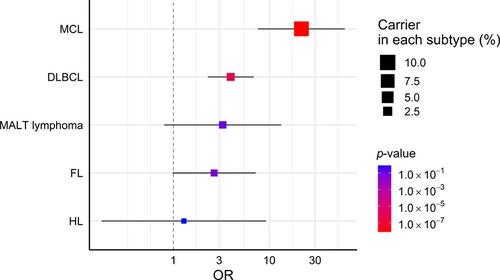当前位置:
X-MOL 学术
›
Cancer Sci.
›
论文详情
Our official English website, www.x-mol.net, welcomes your
feedback! (Note: you will need to create a separate account there.)
Association between germline pathogenic variants in cancer-predisposing genes and lymphoma risk
Cancer Science ( IF 4.5 ) Pub Date : 2022-09-05 , DOI: 10.1111/cas.15522 Yoshiaki Usui 1, 2, 3 , Yusuke Iwasaki 1 , Keitaro Matsuo 4, 5 , Mikiko Endo 1 , Yoichiro Kamatani 6 , Makoto Hirata 7, 8 , Kokichi Sugano 7, 9 , Teruhiko Yoshida 7 , Koichi Matsuda 10 , Yoshinori Murakami 8 , Yoshinobu Maeda 11 , Hidewaki Nakagawa 12 , Yukihide Momozawa 1
Cancer Science ( IF 4.5 ) Pub Date : 2022-09-05 , DOI: 10.1111/cas.15522 Yoshiaki Usui 1, 2, 3 , Yusuke Iwasaki 1 , Keitaro Matsuo 4, 5 , Mikiko Endo 1 , Yoichiro Kamatani 6 , Makoto Hirata 7, 8 , Kokichi Sugano 7, 9 , Teruhiko Yoshida 7 , Koichi Matsuda 10 , Yoshinori Murakami 8 , Yoshinobu Maeda 11 , Hidewaki Nakagawa 12 , Yukihide Momozawa 1
Affiliation

|
The application of advanced molecular technology has significantly expanded lymphoma classification, allowing risk stratification and treatment optimization. Limited evidence suggests the presence of a genetic predisposition in lymphoma, indicating the potential for better individualized clinical management based on a novel lymphoma classification. Herein, we examined the impact of germline pathogenic variants in 27 cancer-predisposing genes with lymphoma risk and explored the clinical characteristics of pathogenic variant carriers. This study included 2,066 lymphoma patients and 38,153 cancer-free controls from the Japanese population. Following quality control of sequencing data, samples from 1,982 lymphoma patients and 37,592 controls were further analyzed. We identified 309 pathogenic variants among 4,850 variants in the 27 cancer-predisposing genes. Pathogenic variants in the following four cancer-predisposing genes were associated with a high risk of lymphoma: ATM (odds ratio [OR], 2.63; 95% confidence interval [CI], 1.25–5.51; p = 1.06 × 10−2), BRCA1 (OR, 5.88; 95% CI, 2.65–13.02; p = 1.27 × 10−5), BRCA2 (OR, 2.94; 95% CI, 1.60–5.42; p = 5.25 × 10−4), and TP53 (OR, 5.22; 95% CI, 1.43–19.02; p = 1.23 × 10−2). The proportion of carriers of these genes was 1.6% of lymphoma patients. Furthermore, pathogenic variants in these genes were especially associated with a higher risk of mantle cell lymphoma (OR, 21.57; 95% CI, 7.59–61.26; p = 8.07 × 10−9). These results provide novel insights concerning monogenic form into lymphoma classification. Some lymphoma patients may benefit from surveillance and targeted treatment, such as other neoplasms.
中文翻译:

癌症易感基因的种系致病变异与淋巴瘤风险之间的关联
先进分子技术的应用显着扩大了淋巴瘤分类,实现了风险分层和治疗优化。有限的证据表明淋巴瘤存在遗传易感性,这表明基于新的淋巴瘤分类更好的个体化临床管理的潜力。在此,我们检查了种系致病变异对 27 个癌症易感基因与淋巴瘤风险的影响,并探讨了致病变异携带者的临床特征。这项研究包括来自日本人群的 2,066 名淋巴瘤患者和 38,153 名无癌症对照者。在对测序数据进行质量控制后,对 1,982 名淋巴瘤患者和 37,592 名对照者的样本进行了进一步分析。我们在 27 个癌症易感基因的 4,850 个变异中鉴定出了 309 个致病变异。以下四种癌症易感基因的致病性变异与淋巴瘤的高风险相关: ATM (比值比 [OR],2.63;95% 置信区间 [CI],1.25–5.51; p = 1.06 × 10 -2 ), BRCA1 (OR,5.88;95% CI,2.65–13.02; p = 1.27 × 10 −5 )、 BRCA2 (OR,2.94;95% CI,1.60–5.42; p = 5.25 × 10 −4 )和TP53 (OR, ,5.22;95% CI,1.43-19.02; p = 1.23 × 10 -2 )。这些基因的携带者比例为淋巴瘤患者的1.6%。此外,这些基因的致病性变异与套细胞淋巴瘤的较高风险尤其相关(OR,21.57;95% CI,7.59–61.26; p = 8.07 × 10 -9 )。这些结果为淋巴瘤分类中的单基因形式提供了新的见解。 一些淋巴瘤患者可能受益于监测和靶向治疗,例如其他肿瘤。
更新日期:2022-09-05
中文翻译:

癌症易感基因的种系致病变异与淋巴瘤风险之间的关联
先进分子技术的应用显着扩大了淋巴瘤分类,实现了风险分层和治疗优化。有限的证据表明淋巴瘤存在遗传易感性,这表明基于新的淋巴瘤分类更好的个体化临床管理的潜力。在此,我们检查了种系致病变异对 27 个癌症易感基因与淋巴瘤风险的影响,并探讨了致病变异携带者的临床特征。这项研究包括来自日本人群的 2,066 名淋巴瘤患者和 38,153 名无癌症对照者。在对测序数据进行质量控制后,对 1,982 名淋巴瘤患者和 37,592 名对照者的样本进行了进一步分析。我们在 27 个癌症易感基因的 4,850 个变异中鉴定出了 309 个致病变异。以下四种癌症易感基因的致病性变异与淋巴瘤的高风险相关: ATM (比值比 [OR],2.63;95% 置信区间 [CI],1.25–5.51; p = 1.06 × 10 -2 ), BRCA1 (OR,5.88;95% CI,2.65–13.02; p = 1.27 × 10 −5 )、 BRCA2 (OR,2.94;95% CI,1.60–5.42; p = 5.25 × 10 −4 )和TP53 (OR, ,5.22;95% CI,1.43-19.02; p = 1.23 × 10 -2 )。这些基因的携带者比例为淋巴瘤患者的1.6%。此外,这些基因的致病性变异与套细胞淋巴瘤的较高风险尤其相关(OR,21.57;95% CI,7.59–61.26; p = 8.07 × 10 -9 )。这些结果为淋巴瘤分类中的单基因形式提供了新的见解。 一些淋巴瘤患者可能受益于监测和靶向治疗,例如其他肿瘤。











































 京公网安备 11010802027423号
京公网安备 11010802027423号